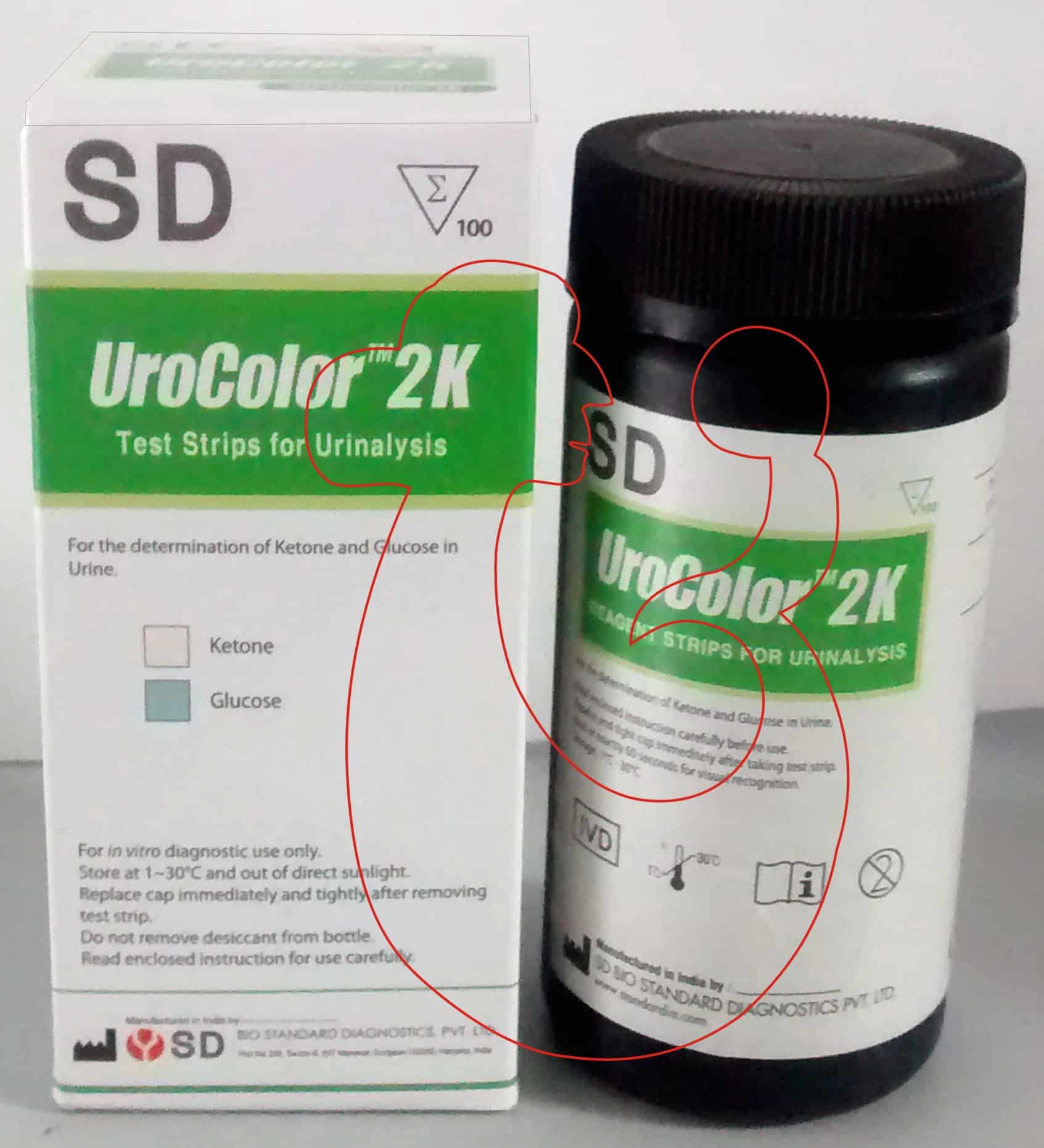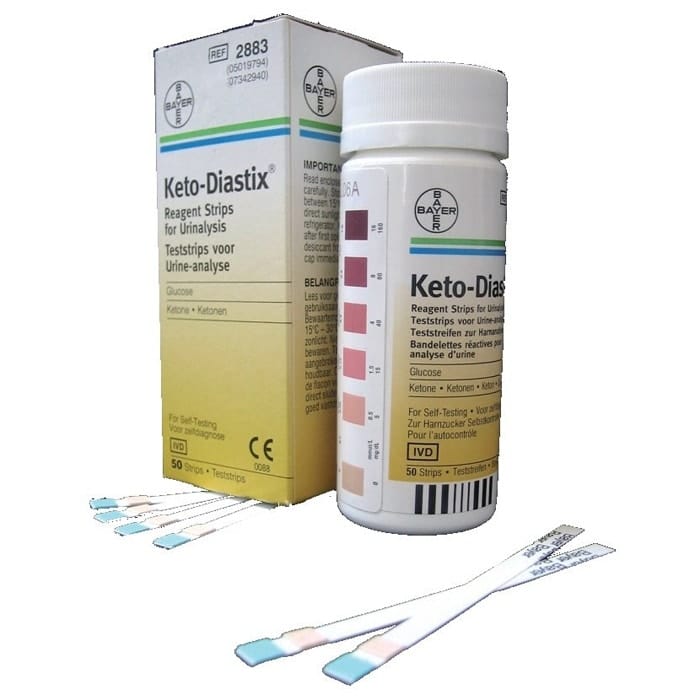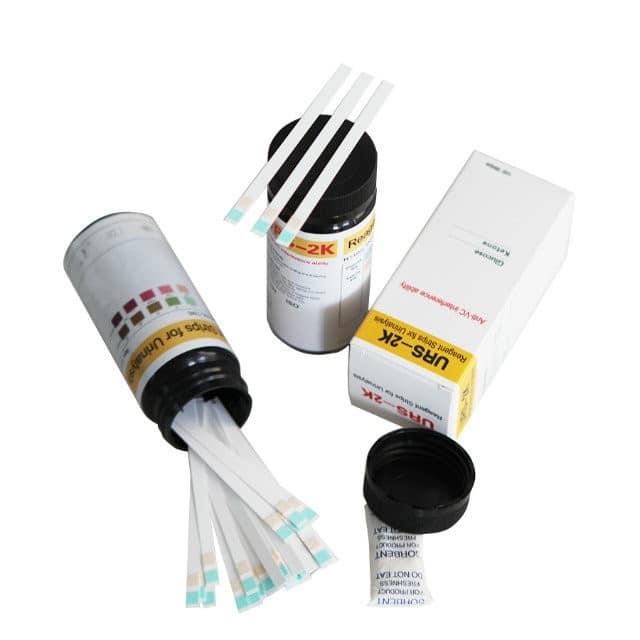How To Test For Ketones
There are three primary ways to test for ketones in your body: through a urinalysis, blood testing, and breath testing. Remember, if you have diabetes, especially type 1 diabetes, testing your urine for ketones should be implemented in your diabetic management plan. Talk to your doctor about ketone testing for more information.
Urinalysis
The most popular way to test for ketones is through a urinalysis. This is one of the more accurate, less invasive ways to test and can be done at home with fairly low marginal error. There are urine test strips for at-home testing available in many places over-the-counter.
Blood Testing
Blood testing for ketones is similar to how diabetics measure their blood glucose levels. Youll need a specific device, which can be purchased for at-home use. Once you prick your finger and administer a blood sample, your readings will appear on the screen.
Breath Testing
Finally, you can purchase a device that will measure ketones through your breath. While this is the most convenient method, many people prefer more concrete methods like a urinalysis or blood test.
Understanding Your Results
When you undergo a ketone test, its important to understand how to read your results. There can be small abnormalities, moderate abnormalities, and large abnormalities.
What Is Insulin Everything To Know If You Have Diabetes
If you are testing for ketones in babies or toddlers who wear diapers, clean cotton wool can also be used to capture urine.
When testing your urine for ketones, its important to make sure that the test strips have not expired.
You do not need a prescription to obtain a ketone test kit from your local pharmacy. Talk to your doctor about which test kit could work best for you and provide the most relevant information.
Results of the ketones in urine test can vary from a specific number or be categorized qualitatively as a small, moderate, or large amount of ketones. Whats considered a normal amount of ketones in urine will vary by age, gender, health history, and other factors, so be sure to talk to your doctor about your exercise and diet habits, as well as other factors that might affect your typical level.
How Do I Prevent Diabetic Ketoacidosis
- Check ketones if blood glucose is higher than 300 mg/dl and when you are sick.
- Give the right amount of ketone bolus if you have small, moderate, or large ketones.
- You have used a ketone bolus for moderate or large ketones twice and your ketones are still moderate or large.
- You have treated a low blood glucose twice and your blood glucose is still low.
- You have thrown up 3 times.
Important to Remember
Recommended Reading: What Age Can You Get Type 2 Diabetes
Work Closely With A Diabetes Educator And Your Doctor
Diabetes management takes constant vigilance to ensure your insulin regimen and eating plan is working effectively. The medication and insulin combination that works best varies depending on the person.
Talk with your doctor if youre concerned about your ketone levels spiking frequently.
Last medically reviewed on May 3, 2022
6 sourcescollapsed
- Diabetes & DKA . . https://www.diabetes.org/diabetes/dka-ketoacidosis-ketones
- Ketones. . dtc.ucsf.edu/types-of-diabetes/type2/understanding-type-2-diabetes/how-the-body-processes-sugar/ketones/
- Ketone testing. . joslin.org/patient-care/diabetes-education/diabetes-learning-center/ketone-testing-0
- Urbain P. . Monitoring for compliance with a ketogenic diet: what is the best time of day to test for urinary ketosis? ncbi.nlm.nih.gov/pmc/articles/PMC5097355/
- Hu, Cheng, et al. Biomarkers of Metabolic Disorders: Diagnostic and Prognostic Values, and Insights into the Pathogenesis. BioMed Research International, vol. 2014, 2014, pp. 12., retrieved from https://doi.org/10.1155/2014/586272.
- Misra, S., and N. S. Oliver. Utility of Ketone Measurement in the Prevention, Diagnosis and Management of Diabetic Ketoacidosis. Diabetic Medicine, vol. 32, no. 1, 2014, pp. 1423., retrieved from https://doi.org/10.1111/dme.12604.
Urinalysis Of Glucose And Ketones

Urinalysis of glucose and ketones are non-invasive tests, which are used to reflect the levels of said molecules in the blood. Such tests are often used to monitor the effectiveness of interventions for diabetics and individuals with insulin resistance . As a means of appreciating the need and role of such tests, the following will briefly explore the same in greater detail.
Diabetes is a condition that affects over 150 million people in the world and is expected to reach 366 million by the year 2030 . Such an aggressive metabolic condition demands vigilance, and methods, that can effectively detect and track its progress. The urinalysis of glucose tests for the presence of said molecule and its concentration. Such data can inform the practitioner of the likelihood of diabetes . Pagna and Pagna indicated that in a healthy individual, the kidneys filter out glucose and redirect the molecule back into the bloodstream. Among individuals who manage glucose poorly, glucose levels rise in the blood faster than the kidneys can filter and redirect glucose back into the system. Consequently, glucose spills over into the urine when blood glucose levels rise above 180 mg/dL .
References
Pagana, K. D., & Pagana, T. J. . Manual of diagnostic and laboratory tests . St. Louis, MO: Mosby.
Westerberg, D. Y. . Diabetic ketoacidosis: Evaluation and treatment. American Family Physician, 87, 337-346.
Don’t Miss: How To Control Pre Diabetic Condition
What Is The Fastest Way To Get Rid Of Ketones
If you detect ketones in your blood or urine, general treatment guidelines include drinking plenty of water or other calorie-free fluids to help flush ketones out of the body, taking insulin to bring your blood glucose level down, and rechecking both your blood glucose level and ketone level every three to four hours.
Levels Of Ketones In The Urine
This would be indicated by either getting a negative or abnormal result. A negative result would mean that you are in the green zone of ketone levels. In contrast, an abnormal result would indicate higher ketone levels than normal. This result is then further divided into three different levels of ketones in urine that you should know about, that is, either low , moderate, or high .
Typically if you have a small level of ketones , you can take a deep sigh of relief, as everything is perfectly fine. If you have a moderate level of ketones in your urine , we would encourage you to consult your local healthcare provider for medical advice as a precautionary measure. And if you have high levels of ketones , contact your local healthcare provider immediately and discuss possible treatment methods.
Note: A urine test for ketones would only indicate current levels of ketone and may be less accurate than a blood test. It would be possible that your doctor would choose to administer a blood test.
Don’t Miss: Can We Cure Type 2 Diabetes
When Should I See A Healthcare Provider For Ketonuria
Ketonuria can be detected with modern glucometers that can detect not only your blood sugar levels but your ketone levels as well.
Ketone levels are measured in millimoles per liter of blood and are considered normal when they are below 1.5 mmol/L.
A reading of above 1.6 mmol/L means that you are at increased risk of ketoacidosis and need to see your healthcare provider immediately.
Moderate Amounts Of Ketones In Your Urine
Moderate amounts of urine ketones will show results of 30 to 40 mg/dl and are a cause for concern as this could indicate that ketoacidosis is developing.
If you have diabetes and are experiencing any of the symptoms listed above, please seek medical attention right away and do not exercise as it can exacerbate conditions.
Don’t Miss: What Is The Earliest Sign Of Diabetes Nephropathy
What Does An Abnormal Result For A Ketones In Urine Test Mean
Abnormal results typically break down as follows:
- Small: 20 mg/dl
- Moderate: 30 to 40 mg/dl
- Large: > 80 mg/d
Small amounts of ketones in the urine can be normal, especially if a person is trying to lose weight and maintains healthy blood sugar levels. People with diabetes who are trying to lose weight should make sure they monitor their blood sugar and ketone levels closely.
If you test for ketones in your urine and the results indicate a small amount, consult with your doctor and continue retesting every few hours.
If test results show moderate or large amounts of ketones in urine, contact your healthcare provider immediately. Its also important not to exercise when ketone levels are high or when your blood sugar is high, as this can worsen effects.
If test results show high levels of ketones in your urine, your doctor may check the amount of ketones in your blood and also conduct the following urine tests:
Treating And Managing Ketones In The Urine
Once you have received your doctors diagnosis, you may be presented with several treatments as your options. Some of the widely known treatments are electrolytes replacement, insulin therapy, and, last but not least, fluid replacement treatment.
In order to manage or avoid high levels of ketones in the future , ensure that you:
- Keep a close eye on your blood glucose and insulin levels regularly
- Consult with your doctor or nutritionist on a carb diet to keep your glucose levels up and normal
- Drink plenty of water
Recommended Reading: Type 1 Diabetes And Kidney Failure
What Are The Symptoms Of Ketones In Your Urine
There are a number of common symptoms you may suffer from if you have ketonuria and these include the following:
- Fruity breath odor
If you have any of these symptoms, it is important that you seek medical attention right away as ketoacidosis, which is when your blood becomes too acidic, can develop quickly and can be life-threatening.
Your doctor or health care professional will check your ketone levels and determine any underlying causes for it.
What Abnormal Results Mean

An abnormal result means you have ketones in your urine. The results are usually listed as small, moderate, or large as follows:
- Small: < 20 mg/dL
- Moderate: 30 to 40 mg/dL
- Large: > 80 mg/dL
Ketones build up when the body needs to break down fats and fatty acids to use as fuel. This is most likely to occur when the body does not get enough sugar or carbohydrates.
This may be due to diabetic ketoacidosis . DKA is a life-threatening problem that affects people with diabetes. It occurs when the body cannot use sugar as a fuel source because there is no insulin or not enough insulin. Fat is used for fuel instead.
An abnormal result may also be due to:
- Fasting or starvation: such as with anorexia
Recommended Reading: How Can I Know If I Am Diabetic
What Is The Difference Between Glucose And Ketones In Urine
| If there is more glucose than it should to be in an individuals urine, the medical condition is termed as glycosuria. It usually occurs because of high glucose levels in blood or kidney damage. This medical condition is a common symptom in patients of both type 1 diabetes and type 2 diabetes. When kidneys are damaged in a person, then renal glycosuria happens. | If ketone level is more than it should be in the urine, then the medical condition is termed as diabetic ketoacidosis . DKA is basically a complication associated with high blood sugar that can result in coma or become even more fatal and cause death. High ketone level detected in urine test can prompt you to consult your doctor and get treatment much before your condition become critical and a medical emergency occurs. |
How The Test Is Performed
Urine ketones are usually measured as a “spot test.” This is available in a test kit that you can buy at a drug store. The kit contains dipsticks coated with chemicals that react with ketone bodies. A dipstick is dipped in the urine sample. A color change indicates the presence of ketones.
This article describes the ketone urine test that involves sending collected urine to a lab.
Recommended Reading: Best Diet For Diabetic Neuropathy
Are Urine Ketone Test Strips Reliable
Occasionally the urine ketone strips are positive but there aren’t any urine ketones. The causes of this include:
- If you are taking some medicines – for example, levodopa, sodium valproate.
- If you are taking vitamin C.
- If your body is very dry .
One of the main problems with urine ketone testing is that there is a delay in the urine becoming positive to ketones. You may have a sudden increase in the level of ketones in your blood but there will be a delay in detecting the high level of urine ketones.
Equally your urine may also be positive to ketones because ketones have passed into your urine over the previous few hours, even though your blood ketone levels have already started to fall.
On other occasions the urine ketone strips may be negative when there are actually urine ketones. Most urine testing kits detect acetoacetate, not the main ketone, which is beta-hydroxybutyrate. It is possible for the test to be negative with high levels of beta-hydroxybutyrate.
How Are Ketones In Urine Treated When Youre Pregnant
It depends on the cause. If you have gestational diabetes, you’ll need to change your diet to manage glucose levels. Your provider may prescribe insulin if diet alone doesn’t help. If you have morning sickness accompanied by chronic vomiting, your provider may prescribe medication to help with nausea or have you get IV fluid hydration.
If ketones in your urine are due to inadequate nutrition, your healthcare provider may recommend eating more calories or eating more frequently.
The following dietary tips will help to keep your ketones at a healthy level:
- Don’t skip meals.
- Drink a lot of water or other fluids to stay hydrated.
- Eat at least three meals and three snacks daily. Having a snack before bed has been associated with lower ketone levels.
- Eat a variety of carbohydrates .
- Include protein in each meal. Some good choices are eggs, beans, meat or tofu.
Also Check: T Slim X2 Insulin Pump Accessories
Euglycemic Diabetic Ketoacidosis A Misleading Presentation Of Diabetic Ketoacidosis
Go to: Introduction Hyperglycemia and ketosis in diabetic ketoacidosis are the result of insulin deficiency and an increase in the counterregulatory hormones glucagon, catecholamines, cortisol, and growth hormone. Three processes are mainly responsible for hyperglycemia: increased gluconeogenesis, accelerated glycogenolysis, and impaired glucose utilization by peripheral tissues. This might also be augmented by transient insulin resistance due to hormone imbalance, as well as elevated free fatty acids. DKA is most commonly precipitated by infections. Other factors include discontinuation of or inadequate insulin therapy, pancreatitis, myocardial infarction, cerebrovascular accident, and illicit drug use. The diagnostic criteria of DKA, established by the American Diabetic Association, consists of a plasma glucose of > 250 mg/dL, positive urinary or serum ketones, arterial pH of < 7.3, serum bicarbonate < 18 mEq/L, and a high anion gap. The key diagnostic feature of DKA is elevated circulating total blood ketone concentration. Hyperglycemia is also a key diagnostic criterion of DKA however, a wide range of plasma glucose levels can be present on admission.Continue reading > >
Can You Be In Ketosis And Not Have Ketones In Your Urine
You can be in ketosis if you’re on a low-carbohydrate diet or fasting, or if you’ve consumed too much alcohol. If you’re in ketosis, you have a higher than usual level of ketones in your blood or urine, but not high enough to cause acidosis. Ketones are a chemical your body produces when it burns stored fat.
Read Also: High Blood Levels In Diabetes
What Do My Urine Ketone Test Results Mean
Monitoring ketone levels in urine is important if you have type 1 diabetes. Ketones are more commonly seen in the urine of people with type 1 diabetes than in people with type 2 diabetes.
If youre told to monitor your ketones, ask your healthcare team to help you develop a plan for what to do if you do detect ketones in your urine.
Typical or trace levels of ketones in urine are less than 0.6 millimoles per liter , according to the National Health Service .
A result greater than this means you have ketones in your urine. The readings are usually classified as small, moderate, or large.
When To Get Medical Help

Go to your nearest A& E immediately if you think you have DKA, especially if you have a high level of ketones in your blood or urine.
DKA is an emergency and needs to be treated in hospital immediately.
- your blood sugar or ketone levels are high or getting higher over time, but you do not feel unwell
- you feel unwell but your blood sugar or ketone levels are normal or are only a little bit higher than usual
If you cannot contact your care team or GP, call your local out-of-hours service or NHS 111 for advice.
Recommended Reading: Whos At Risk For Type 2 Diabetes
Everything You Need To Know About Ketones In Urine
When you visit a urologist, one of the most common tests performed is a urinalysis. A urinalysis helps your doctor see how well your body is functioning and whether or not everything is working as its meant to be. Urine gives insight about your habits, underlying conditions, whether or not you have any infections, and more. Contrary to what you might think, your urine says a lot about you. Therefore, it comes as no surprise that a urinalysis is such a routinely performed test. In certain instances during a urinalysis, your test results may come back with elevated levels of ketones. If this happens, it could be a sign of something more serious. To better understand what this means, were going to dive into everything you need to know about urine ketones.